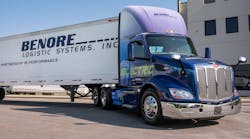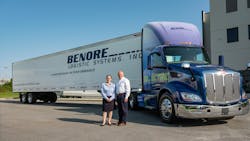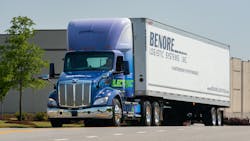For most truckload carriers operating outside of California, the potential of battery-electric heavy-duty trucks is theoretical. Family owned and operated Benore Logistic Systems is gathering data this spring to see how it can turn EV operations into reality in the Southeast.
A Peterbilt Model 579EV hauled its first load from Benore’s Greer, South Carolina, location on April 28. Benore Logistics (No. 196 on the 2022 FleetOwner 500: For-Hire list) is on a 10-year mission to cut its carbon emissions in half. That mission could include dozens more heavy-duty EVs, but the future has started with just one.
See also: Fleet electrification: Go or no-go for launch?
The fleet said it is the first carrier to add a Class 8 battery-electric vehicle to its South Carolina regional fleet operations. Peterbilt parent-company Paccar also installed a 150kW fast-charger at the Greer terminal.
Based in Erie, Michigan, Benore operates in the Midwest, East Coast, and Southeast. The fleet delivers parts from automotive suppliers to automotive manufacturers. “We have a lot of short-haul routes per truckload—we can go 20 times a day back and forth, picking up parts on a five- to 10-mile route,” Dennis Kunz, the carrier’s VP of revenue strategy and operation development, told FleetOwner. “This creates an ideal scenario for these battery-electric trucks.”
An opportunity to offer EV hauls
While he can’t see a Class 8 BEV working into long-haul operations, Kunz said these short, repetitive routes could be ideal. “We’re going in and out so many times—and we probably would have some dwell time between loads that we could opportunity-charge the tractor and really utilize this product almost in a 24/7 environment,” he explained.
Along with a vehicle charger at its Greer location, Benore had a charger installed at one of its customer’s locations to create another opportunity to charge the Peterbilt tractor until its next trailer is ready. “We may never get out of that 20% to 70% battery charge level by opportunity charging during the 10 to 15 minutes between loads, during a 15-minute break, having 15 minutes for breakfast, having 30 minutes for lunch,” Kunz said. “That may be enough to keep the tractor going 24/7—and that’s what we’re looking for.”
See also: EV makers that listen to fleets are leading the race
This first EV will be used to analyze how it operates with various loads before the fleet adds more zero-emission trucks, Kunz explained. Along with testing out the range—Peterbilt advertises as many as 150 miles on a full charge—Benore also plans to review how speed, length of route, terrain, and idle time affect the battery power. Over the next month, the fleet will run the 579EV on the same route for five to 10 days before tackling a different lane.
“This way, we can collect enough data to see how the tractor behaves in different weather conditions on certain loads,” Kunz explained. “Then we’ll rotate it to another lane, and we’ll see how it performs there.”
Using data to map its fleet's future
This data will create a basis for the carrier’s future electric truck usage as it expands Benore’s sustainability program. “Then we can actually go out and price these battery-electric vehicles as a mileage rate or trip rate to our customers,” Kunz said. “Right now, we have a TCO model—but it’s based on assumption, and we’re trying to refine that with real data.”
Based on the 150-mile battery range of the 579EVs, Kunz said he could see up 30 more of the Class 8 tractors in his fleet. “We don’t have the infrastructure to do it yet,” he added. “But just from a mileage and range perspective, anything within a 20-mile radius, we could have up to 30 battery-electric trucks support it today.”
But getting there will depend a lot on how the initial tests go with the first heavy-duty EV. Kunz added that it would also depend on what the fleet’s customers want. “A lot of things depend on how this test is performing and how the total cost of ownership calculation turns out,” he explained. “I think it’s natural there will be a cost increase. The question is does the customer what to pay that cost increase? How much is carbon-saving worth to the customer? Everybody talks about it—but does anybody actually put a dollar sign and a number in front of it?”
Benore was able to use grants to support its EV exploration. But Kunz notes that a BEV costs a lot more than a diesel tractor. And while maintenance is expected to cost less for the new technology and energy costs are more stable for electric vehicles than diesel trucks, the carrier still needs that data to know its potential and limitations.
“We are very honored to bring the first electric truck to the state of South Carolina, supporting our sustainability goals of reducing carbon emissions and making the world a better place for future generations,” said Jeffery Benore, the fleet's CEO and president.
Kunz credited the CEO’s alt-fuel foresight. “We want to do the right thing,” he said. “We’re not in it to make huge profits off of it. We just want to be forthcoming to our customers. And with everything that is happening today on the West Coast, Jeff Benore has the vision and wants to be on the forefront on the East Coast. That’s why he ordered this truck.”






